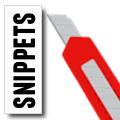
Docker 0.7 unloading: With Docker 0.7, the Docker developers have made a big leap in Linux coverage. (If you are new to Docker, read the introduction to it I did for the Linux Foundation). Under the covers, Docker has used storage drivers to maintain images on disk, but up till now they’d needed a patched Linux kernel for that to work. A patch from Red Hat has changed that though and adds “DEVICEMAPPER”, a storage driver which used copy-on-write LVM snapshots and doesn’t need a patched kernel, to the list of storage drivers. The selection of the driver needed is done automagically and the resultant images are interchangable between different drivers so there’s no driver lock-in. That all means that Docker now runs on Fedora, RHEL, Ubuntu, Debian, SUSE, Arch, Gentoo and others. More drivers are coming too, for BtrFS, ZFS, Gluster and Ceph. Other additions, merged in the 0.6 cycle include offline image transfer, better port redirection, linkable containers and descriptive names for containers.
DragonFlyBSD updated: Version 3.6 of DragonFlyBSD – the now ten year old BSD project that sets out to give BSD native optimised clustering capabilities – has been released. The update standardises on Dports and pkg for installation tools, making around 20,000 packages available, and the process of building those 20,000 packages in parallel has allowed for the testing and near elimination of kernel contention with more cores scaling up the improvements made. There’s also i915 and KMS support, albeit experimental, and updated localisation. DragonFlyBSD is still using its HAMMER filesystem with work on HAMMER2 carrying on into DragonFlyBSD 3.7.
Coding Advice: Whether your learning or experienced, this article offers sage advice on how to approach coding. While we’re on the subject of advice, here’s some false things that programmers believe are true about geography, addresses, names and time.
This article was imported from the original CodeScaling blog